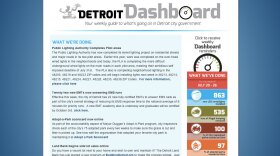It’s easy to feel sometimes like we’re awash in lots of numbers in the news.
There are all kinds of data about foreclosures, costs of health, poverty, you name it.
But it’s all just numbers. It can be hard to look through the data to see the real people beneath. Numbers don’t tell you about moms struggling, hungry kids, or people who sleep on concrete at night.
Alex B. Hill has been thinking a lot about the separation of big numbers and real people.
Hill heads a project called DETROITography. He recently spoke and blogged about how hard it is to be empathetic about data, but also how it reveals a lot about the struggles of individuals.
“A lot of times it’s easy to list the big numbers and feel like that’s going to have an impact, but humans can’t process big numbers,” he says.
It’s often assumed that our decisions are rooted in logic and reason, but Hill tells us there’s a growing body of psychological research suggesting that emotions play a much larger role in our decision-making process than we think.
In order to make effective and informed decisions, Hill says we need to marry data and emotions in a way that is more digestible.
“Data needs stories, but stories also need data,” he says. “If you can tell the stories and also connect that with the data, providing context for that data, or vice-versa, you can have some really powerful stories.”
Hill points to the story of James Roberts, “the walking man” in Detroit who had to walk 21 miles round trip getting to and from work because he didn’t have access to a car and the public transit system doesn’t provide consistent service in much of the area.
There are solid data showing that two thirds of Detroit residents don’t have access to a vehicle, but those numbers don’t effectively convey the real implications and difficulties that poses. Most of us didn’t “get it” until hearing the story.
And while it is a good example of how personal stories can draw our attention to larger issues, Hill tells that alone isn’t enough.
“That story had a huge outpouring of support for him … but obviously that didn’t get back to the kind of broader systemic issue of transportation in our Metro Detroit region,” he says.
So how can we use data to make informed decisions and create long-lasting, effective change? Hill says it’s all about perspective.
“We need to take a step back from doing kind of that data science and really ask the human questions,” he says. “I’m running this data model, is it even relevant? Is it going to have an effect on peoples’ lives? What is that outcome going to be?”
– Ryan Grimes, Stateside




